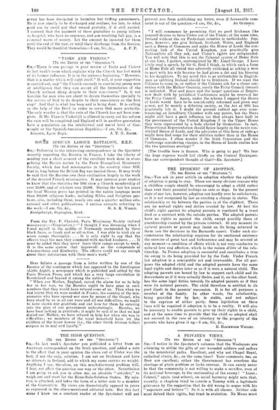THE IRISH QUESTION.
(To TEE Enema or THE " Sermo.rox."1 Ent,—In last week's Spectator you published a letter from an American correspondent on the Irish question, and added a note to the effect that in your opinion the clean cut of Ulster was the best, if not the only, solution. I am not an Irishman and have so interests in Ireland, add to which my name carries no weight. Anything I say-, therefore, on this much-discussed problem will, I fear, not affect the question one way or the other. Nevertheless I am going to ask you to allow me, an absolute "outsider," to weigh out and start for the Home-Rule-Solution Stakes. My solu- tion is attached, and takes the form of a letter sent to a member at the Convention. My views are diametrically opposed to yours as expressed in the above-mentioned editorial note. But this fact alone I know (as a constant reader of the Spectator) will not
prevent you from publishing my letter, even if favourable com-
"I will commence by premising that no good Irishman like yourself desires to force Ulster out of the Union; at the same time, Ireland without the six Protestant counties is unthinkable. Sup- pose, however, you give Ireland, Scotland, Wales, and England each a House of Commons and make the House of Lords the con- necting link of the United Kingdom, you practically give Nationalists all they ask, and Ulster's rights are safeguarded. You will note that this is not the Colonial system of Home Halo at one time, I gather, contemplated by Mr. Lloyd George. I have lately read a speech, by Sir G. Reid I think, iu which such a form of Home Rule all round was adversely criticized as asking a HIRn to part with his wife because he bad given a dot and his blessing to his daughters. To my mind this is as unthinkable to English- men as splitting Ireland should be to Irishmen. If we want the Colonies to come in, or rather if the Colonies ask for a closer con- nexion with the Mother Country, surely the Privy Council (recast) is indicated. War and peace and the larger questions of Empire now dealt with by periodical Conferences might be reserved for the Privy Council. Again, under the scheme I suggest the House of Lords would have to be considerably reformed and given real power, not be merely a debating society, as the Act of 1911 has practically left it. I doubt the present radical age ever coun- tenancing an hereditary Chnmber with any power, but the Peers might still have a goad influence (as they always have had) in the government of the United Kingdom if in the Upper House they were represented by no body elected by themselves. In fact, Proportional Representation should figure largely in the newly con- stituted House of Lords, and the advocates of this form of suitrnt•o might here find scope for their abilities rather than in the House of Commons. I often wonder if the Irish Convention and the Conference considering changes in the House of Lords realize haw the two questions overlap?"
[The trouble here is finance. Who is going to pay? We fear the huge expense would fall chiefly on the Central Exchequer. Has our correspondent thought of that?—Ee. Spectator.]


























 Previous page
Previous page